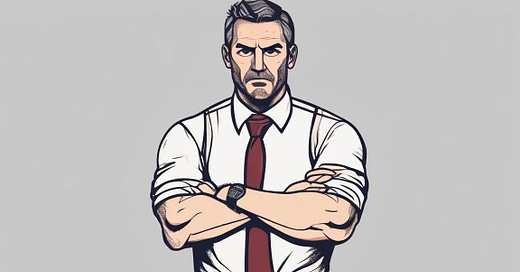How To Ruin Perfectly Good Relationships Part 2
Covert Contracts, The Worst Boss Ever, The Stories in Our Head
My younger self was very good at ruining perfectly good relationships, and I think it’s because my social IQ started at the wrong end of the bell curve, meaning I’ve had to learn social intelligence. I want to cover two things in this article, how I started as one of the worst bosses ever, and what I need to look for when I’m disappointed in other people.
Justin was fresh out of trade school when I hired him to be the first full-time mechanic at my fledgling auto repair shop. My employee training program at the time was little more than: here’s your work area, that’s where you put your toolbox, now get to work. I never had full time employees before then, and I learned the hard way what it takes to be a good leader.
I regretted my assumption that because Justin had a freshly inked auto repair degree, he knew how to work on cars, when he jacked a car up by the malleable floor pan rather than the structurally reinforced frame rail. I found out he molded the floor into a new shape when I tried to drive the car, and I couldn’t because the floor was raised in front of the gas pedal, preventing my foot from using said device.
At the time I blamed the trade school for not teaching the basics and internally berated Justin for a perceived lack of intelligence. Now, after diving deep into leadership training, I realize it was my fault for having expectations of how things “should” be rather than having a conversation about the reality of his level of competence.
Having assumptions about how people should behave and what knowledge they keep in their heads is, in my experience, a recipe for being consistently let down by others. Even the most intelligent people haven’t experienced what we have, therefore they haven’t learned the same lessons we have, either.
The situation worsened, and ultimately killed my relationship with Justin, when I never adjusted my expectations of Justin's level of professional development. I kept thinking, "what's wrong with him, he ought to know this stuff,” and “I shouldn’t have to teach him the basics of auto repair, they should have done that at the school.” Instead of taking the time to teach him, I decided to let him go. I haven’t talked to him since.
As I’m writing this, I’m trying to forgive myself for not knowing then what I know now, because Justin was a hard working young man who reliably showed up to work on time, and tried to do his best. I can’t imagine what the weight of my disapproval did for his self-esteem and self worth. Tearing someone down is the opposite of building them up, and even though it takes some heat to polish a diamond, consistent disapproval will crush the spirit.
When I’m disappointed in others, I’ve learned to look out for those ‘should’s’ and ‘ought-to’s’ popping up in my thoughts or language, for they are key indicators that the story I have in my head has taken a break from reality. The story I have in my head - the should-haves, the ought-to’s, they should just know’s, I thought that was common sense - is not helpful. The question, “What would be true if I were in their situation and thought I was doing the right thing,” allows me to get on their side, which is the only way to bring them over to my side.
It is far more helpful to come from a place of curiosity, compassion, and communication. As often as possible, I try to get agreements rather than have unspoken expectations. Unspoken expectations are called covert contracts, and just like a covert operative on a secret mission, covert contracts lie in the dark waiting to ambush our relationships. If we assume others can read our minds, we are setting them up for failure.
A common counter-argument to creating agreements is best explained in the following example: What if I create an appointment with someone and they don’t show, shouldn’t I expect them to notify me if they can’t make it? Personally, I've chosen to be responsible for what is important to me, and because it’s important to me that people show up on time or notify me, I choose to speak that out loud instead of leaving those words unsaid. I may choose to let other less important things slide, like reminding my wife to stick to the agreement that she move the car seat back after using my car, so I don’t clobber my knee on the ever so cleverly placed tilt mechanism on the steering column. I have the bruises to prove it.
It can be very difficult to slow down long enough to have the conversations necessary to turn covert contracts into spoken agreements. It helps to get clear on priorities… What is more important, a long-term healthy relationship that can continue to grow and produce fruit, or the temporarily important task of the day that is sure to be forgotten by the end of the month?





…powerful reflection and one that I am sure most can see themself inside of…so easy to learn this too if no one ever teaches you the leadership skills needed to lead…great lessons…